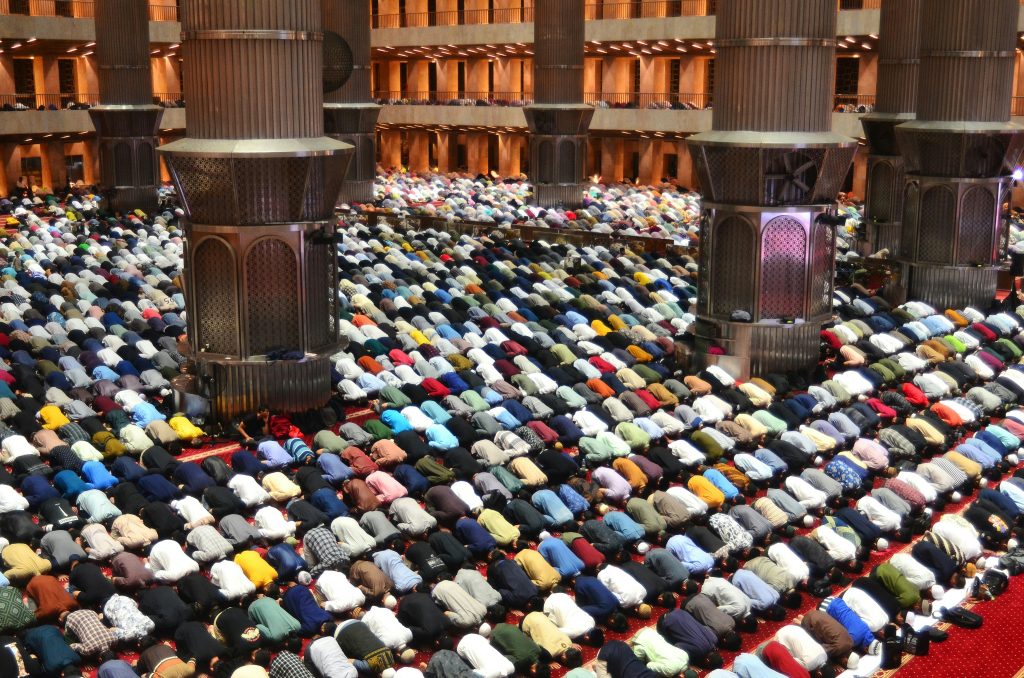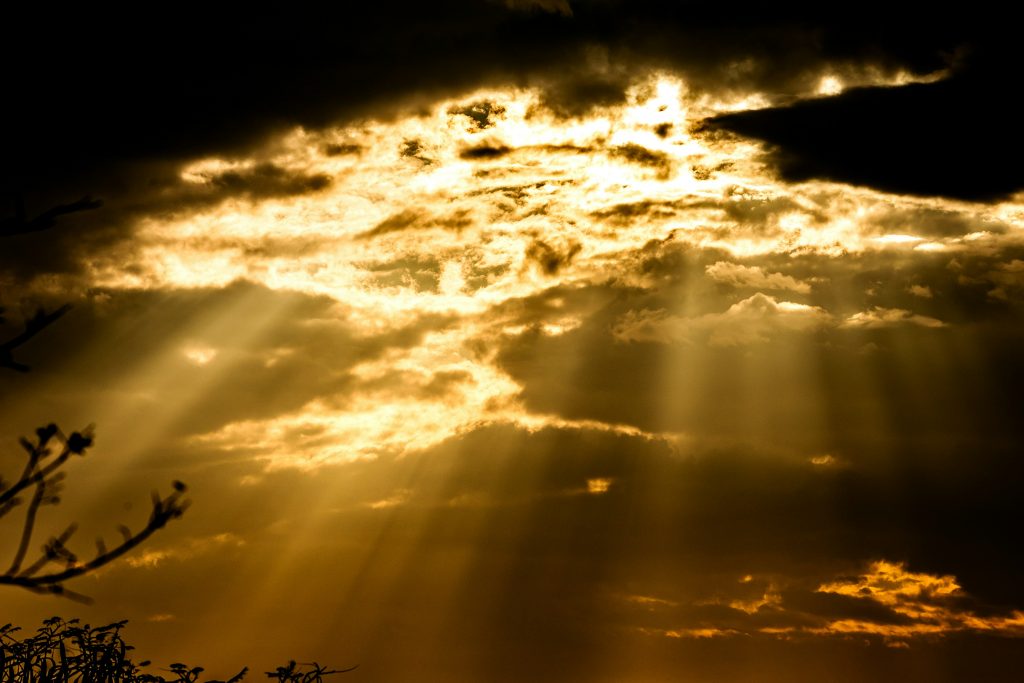
Death has always been the end in the eyes of the world. Its fear has always permeated our being, like a nightmare where you are running away from something sinister and inescapable. It exists only as a malignant enemy that takes selfishly from the living. It gives no explanation and invites itself, leaving behind a permanent goodbye suspended in the air, never spoken.
It manifests itself in our art, taking different names, faces, and stories. We idolize it, personify it, celebrate it, and attach meaning to it all to make sense of the unexpected grief and loss that accompanies it.
Seemingly, the only just thing about death is its compendious grip. Allah says in the Holy Quran, “All that is on it (earth) will pass away.” [1] None can escape it no matter how hard they try. Myths of immortality and the supernatural have been woven into the fabric of our culture to avoid this fact, yet it remains inevitable.
The world around us, however, is a testament to the fact that death is much more common and less frightening than we thought.
“What goes too long unchanged destroys itself. The forest is forever because it dies and dies and so lives.” [2]
Nothing can live forever. There is no such thing as everlasting life, but all living things must die, to some extent, in order to live. When forests burn down they are reborn as a formidable ecosystem; when trees lose their leaves in the winter, clawing lifelessly at the sky, they return with full force in the spring. Flowers cyclically wither away and bloom; snakes shed their skin; caterpillars emerge as butterflies after their dormancy; and our cells constantly die and recycle. Everything that lives is constantly in a cycle of rebirth. For life to prevail, death is necessary.
This is all a part of the system of God. Every being in His system has been given their means of progression through death and rebirth. What about humans? Is our one physical death not the only death we undergo?
Humans are inherently spiritual beings [3] and God reflects His spiritual system in the physical realm. Our souls are our true form – our bodies are our vessels. Spiritual life lies in forsaking what hinders our souls’ development. Spiritual death, however, lies in indulging in that poison. [4]
We forsake things for the greater good. We abandon binging on Netflix for a productive day, eating out for a better body, toxic friends for peace of mind, and so much more. Forsaking is a necessary death that comes with pain. A pain that serves as a hallmark of a detrimental part of you dying for your own well being.
How do we carry out this reviving death?
The Promised Messiah, Hazrat Mirza Ghulam Ahmad (peace be upon him), has said:
“The day our physical life undergoes death is the day of the manifestation of God. We are blind till we become blind to the sight of all besides God. We are dead till we become like a corpse in the hand of God. It is only when we face God completely that we acquire the steadfastness that overcomes all passions of self; and that steadfastness brings about the death of the life that is devoted to selfish purposes.” [5]
Islam is a practical discipline, the basis of which is self reformation. When one submits to God and becomes a Muslim, he has vowed to follow commandments that will require him to bring an end to his way of life. Salat, Zakat, Fasting, Eid, Hajj; every practical spiritual discipline in Islam is a means to improve our moral state and enhance our spiritual state. [6] This is what it means to strive in attaining Allah’s love. Facing our demons means we shed our deceptive skins, burn our sins in prayer, and find peace in the cocoons of our solitude.

This is what it means to destroy the Nafs (self). It is the point when man is so lost and immersed in their Lord that, to an extent, they become Him; as illustrated by Rumi:
Once a man came and knocked at the door of his friend.
His friend said, “Who art thou. O faithful one?”
He said, “’Tis I.” He answered, “There is no admittance.
There is no room for the ‘raw’ at my well-cooked feast.
Naught but fire of separation and absence
Can cook the raw one and free him from hypocrisy!
Since thy ‘self’ has not yet left thee,
Thou must be burned in fiery flames.”
The poor man went away, and for one whole year
Journeyed burning with grief for his friend’s absence.
His heart burned till it was cooked; then he went again
And drew near to the house of his friend.
He knocked at the door in fear and trepidation
Lest some careless word might fall from his lips.
His friend shouted, “Who is that at the door?”
He answered, “’Tis Thou who art at the door. O Beloved!”
The friend said, “Since ‘tis I, let me come in,
There is not room for two ‘I’s’ in one house. [7]
Every spiritual journey begins at ‘I.’ We begin with our own desires, egos, flaws, and sense of accomplishment, yet we know that we cannot attain the companionship of God so long as we remain ourselves. Many wars waged and thousands of deaths later all of our blemishes go up in flames, and from the ashes of the individual rises a new creation – one who possesses a crystalline mirror of a heart, worthy of reflecting the attributes of their Lord. God’s desires become their desires, His words are their words, and His movements, their movements. They emerge victorious from the wars that were encapsulated by withdrawals, lapses, relapses, guilt, shame, remorse, temptations, urges, and honest conversations with oneself.
The Promised Messiah (peace be upon him) has said,
“The reality of Islam is to present one’s neck to God like the sacrificial lamb; to give up one’s own designs and to be devoted to the designs of God and His pleasure; to lose oneself in God and to impose a type of death upon oneself; to be dyed in the personal love of God and to obey Him entirely for the sake of that love; to obtain eyes that see only through Him, and to obtain ears that hear only through Him, and to develop a heart that should be wholly devoted to Him, and to obtain a tongue which would speak only at His command. This is a stage where all search ends; human faculties complete their functions and man’s ego dies completely. Thereupon Divine mercy confers a new life upon the seeker through His living words and His shining light… Thus, the purpose of religion is fulfilled and having beheld God, man casts aside the dirty garment of his lower life and puts on a garment of light. He waits for a sight of God and of heaven not merely as a promise to be fulfilled in the hereafter, but in this very life. He achieves the bounties of sight and converse and heaven.” [8]
This is life; true life. Spiritual beings were never meant to find contentment and fulfillment in material means and physical pleasures.
A spiritual death is not only painful but arduous. This is why it is referred to as a Jihad (struggle). You will have to confront your flaws face to face, chart the oceans of your trauma, show patience and resolve in the face of temptation, and constantly make the choice to be kind and empathetic despite being wronged.
Putting the cost of true life in perspective is daunting. It doesn’t seem worth the pain. Life seems fine the way it is. There doesn’t seem to be a need for us to kill our souls, but that is exactly it. Not undertaking this journey is our death.
We might be physically alive but our souls can still die. When a person becomes complacent, his days spent neglecting the needs of his soul but fulfilling the physical needs of his body, is his spiritual death. There is no vigour or satisfaction in that so-called “life.”
This is the truth which is loud yet unspoken. It is the tension in the air after achieving one’s goals and still not feeling satisfied. It is the yearning that we all have deep down inside us towards something greater. For what is greater proof of the existence of water than thirst itself? How many artists have died portraying mediums of the pain of their existence? How many philosophers died unable to answer the timeless question of purpose? How many psychologists, scientists, historians, writers, poets all died almost having their finger on the meaning behind all of the patterns in their field yet were unable to see the bigger picture?
Islam is the only state of being that truly keeps us alive. It is the only discipline that calls for constant, neverending exertion. It breeds resolve, fortitude, and uproots us from the complacency of the comfort zone. It teaches us that death is not a monster, but a necessity. The trials we face in the constant interplay between life and death push us to move forward and evolve.
This is the philosophy of martyrdom (Shahadat) in Islam. Shahadat is not a fanatic suicidal wish. It does not mean that one should go out looking for death and if he attains it he is guaranteed paradise. The word Shaheed means a witness; one who has testified to the truth of God by giving their lives in His path. Someone who fought numerous inner battles and brought several deaths upon their former, sinful selves that they reached a spiritual rank worthy of witnessing their Lord.

The Holy Prophet (peace and blessings of Allah be upon him) once said,
“Who sought martyrdom with sincerity will be ranked by Allah among the martyrs even if he died on his bed.” [9]
A physical death means nothing. True life lies in the thousands of spiritual deaths we undertake in our lives. It was never about how we die, but how we live. Martyrdom is not given, it’s earned.
Hazrat Musleh-e-Mau’ud (may Allah be pleased with him) says,
ہے عمل میں کامیابی موت میں ہے زندگی
In action there is success; in death there is life. [10]
In death there is life, which is why Allah says, “And say not of those who are killed in the cause of Allah that they are dead; nay, they are living; only you perceive not.” [11]. They attained spiritual life and continue to live on through the people they affected.
Lastly, in the funeral prayer we recite:
“O God forgive our living ones and our deceased ones, and those of us who are present and those who are absent, and our young ones and old ones, and our males and our females. O God, those of us whom Thou grantest life keep them firm on Islam, and those of us Thou causest to die, cause them to die in the faith. Deprive us not, O Allah, of the benefits relating to the deceased and subject us not to trial after him.” [12]
When we witness death we pray for two things: for the living to be firm on Islam and for the dead to die in the faith. We are praying “O Allah those of us whom You have granted physical life to, keep us spiritually alive by keeping us firm on Islam. Help us continue to bring spiritual deaths upon ourselves so we too, can live.” Then we pray, “O Allah, those whom You have caused to die, cause them to die in a state of life.”
This is Islam. The path of reformation. The path of death. And the path of life.
References
[1] (55:27)
[2] —Tales From Earthsea: Dragonfly, by Ursula Le Guin
[3] (32:10)
[4] (91:8-11)
[5] Philosophy of the teachings of Islam pp. 112-113
[6] (11:115)
[7] The Masnavi, Book 1, p. 71 Till man destroys “self” he is no true friend of God.
[8] Lecture Lahore, Ruhani Khazain, Vol. 20, pp. 160-161 (From Essence of Islam Volume 1)
[9] Sahih Muslim 1909, Book of Government, Chapter: It is recommended to seek Martyrdom in the Cause of Allah, Exalted is He.
[10] Kalam Mahmood, Poem #103
[11] (2:155)
[12] Sunan Ibn Majah 1498, Book Regarding Funerals, Chapter: What was narrated concerning supplication during the funeral prayer



